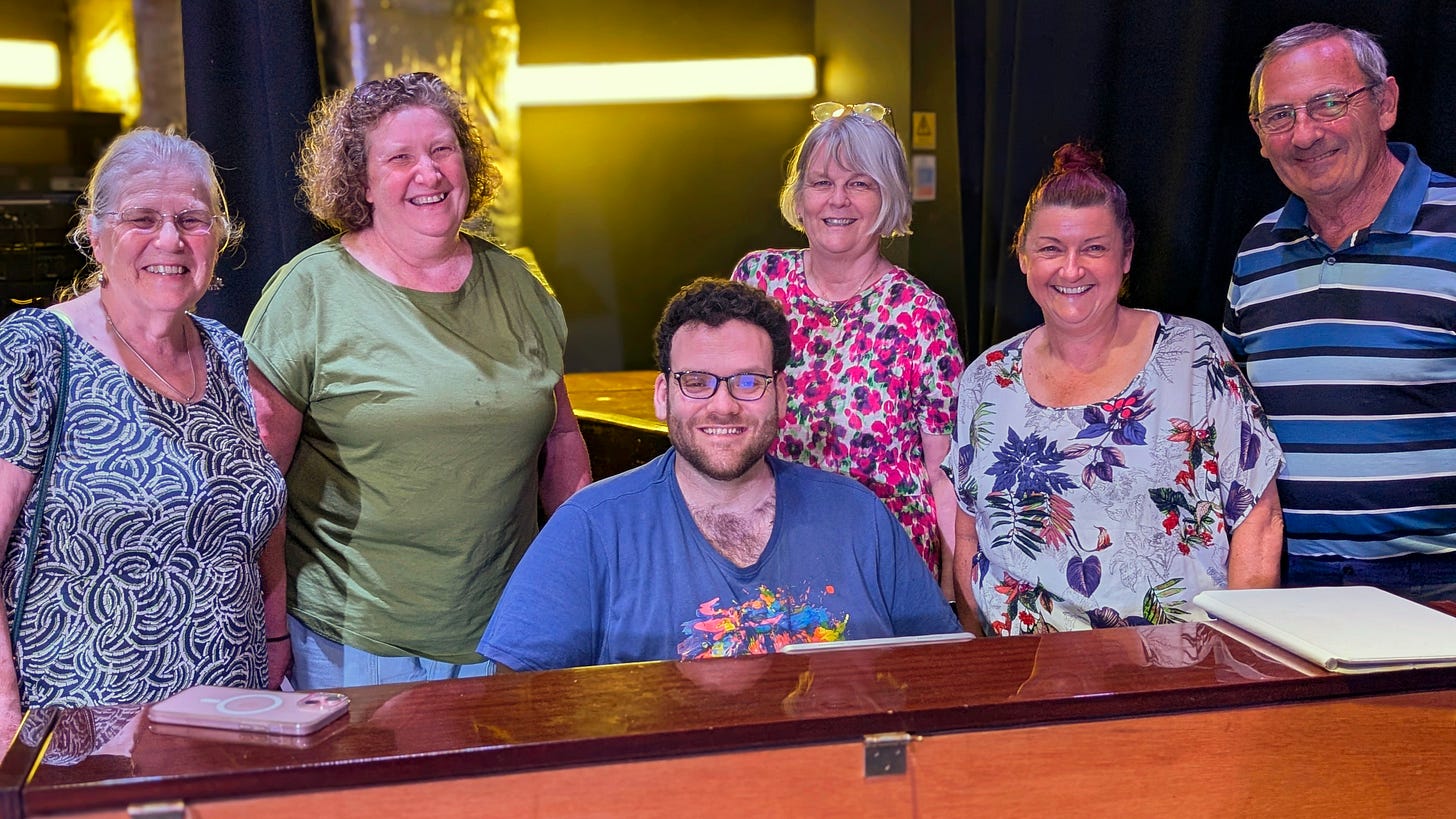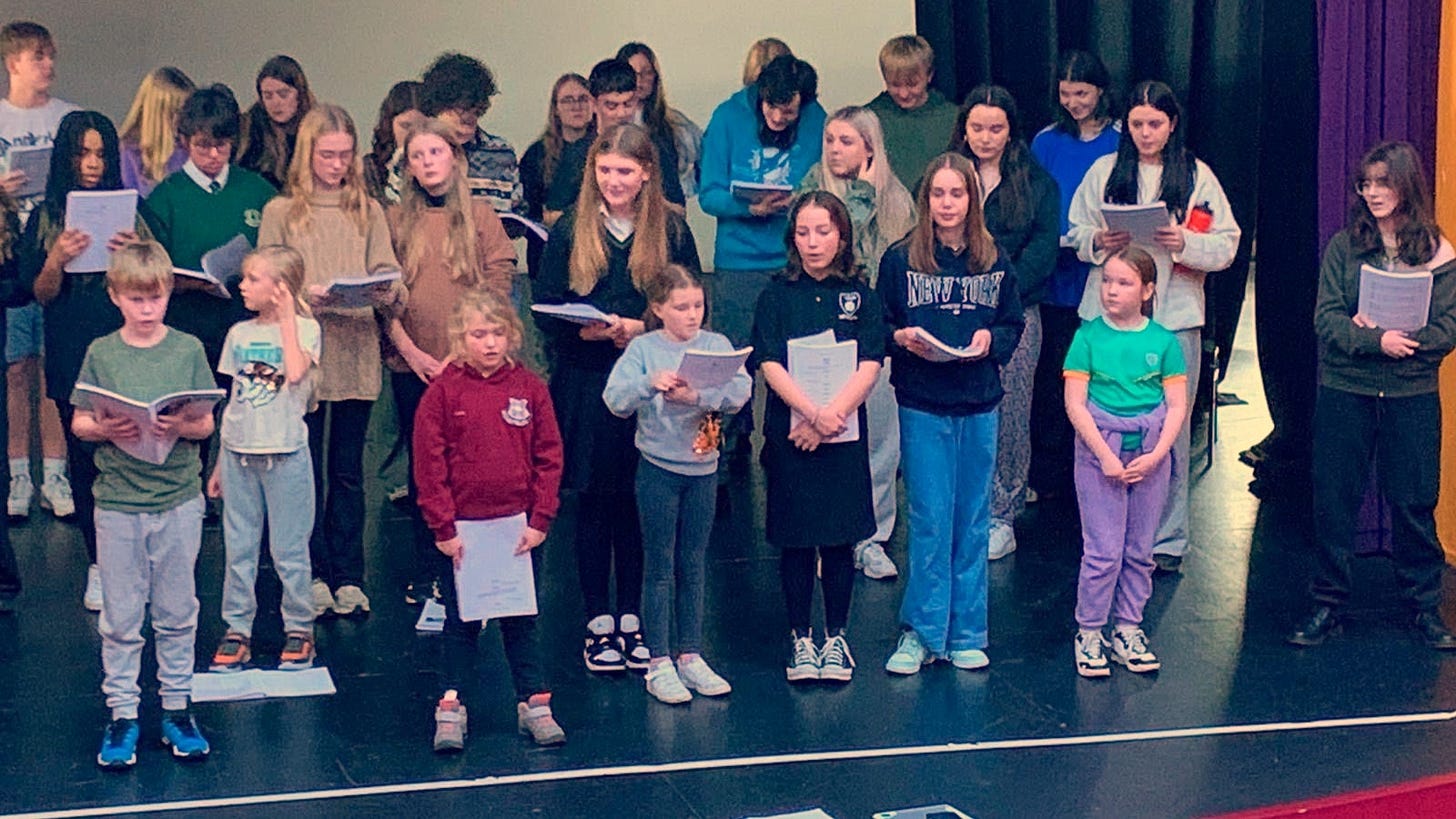Spotlight on The Easy Street Theatre Company
Empowering Young Lives Through Creativity, Community and Connection
"Connection is the energy that exists between people when they feel seen, heard, and valued." — Brené Brown
In a city still reeling from social distancing and transactional routines, these words ring especially true. They remind us that the antidote to post-Covid isolation is genuine human connection – exactly what Easy Street Theatre Company offers Sheffield’s young people. Easy Street is no ordinary youth club or after-school project. Founded in 2009, it provides members with “a combination of educational learning and practical performance experience” in a supportive, creative environment. Based at the Merlin Theatre, the company stages three professional-grade musicals a year – from Frozen to Les Misérables – all brought to life by children and volunteers.

Community members like Sallianne (Sal) Foster-Major – a Sheffield Hallam graduate and the company’s founder – have poured years of their lives into this work. Sal, who previously co-founded Sheffield’s Picture House Youth Theatre, has directed nearly 60 shows. Today she leads Easy Street as its unpaid director and producer, alongside a team that is 99.9% volunteer (only the musical director receives a salary). Everything from choreography to set-building is handled by people who simply want to help young performers shine. As one volunteer put it, “Everybody here has something to give – whether it’s teaching a dance move or sewing a costume.” This ethos is captured on Easy Street’s website: they pride themselves on being “brave, bold, supportive, creative and inspiring,” and aim to equip every child with “essential skills which will stay with them for the rest of their life”.
Easy Street’s impact can be seen in its alumni: former members have gone on to drama schools across the UK – from Guildford’s School of Acting to the Royal Birmingham Conservatoire – and even to study at Cambridge University. One superstar recruit, Helena Anderson, is now co-directing the Cambridge Footlights show at the Edinburgh Fringe. These successes are quiet, grassroots wins: the kind of life-changing growth that we call “planting sequoias” for the future. Easy Street has been doing just that for over a decade, steadily nurturing talent without a grand plan or big funding – only care and persistence.
From my conversation with Director Sal Foster-Major, trustees Philip Smith a long-time supporter and landscape gardener) and Sue, a former headteacher and passionate advocate for youth development, along with dedicated volunteer Amanda Tagg, the heart of Easy Street Theatre Company came alive. What united everyone present was more than shared memories or organisational roles, it was the unmistakable sense of personal calling. A calling to invest in young lives not out of obligation or transaction, but out of deep conviction that connection, confidence and creative community are what children need most in today’s world.
When Sal shared that Easy Street’s longtime rehearsal space on Little London Road had suddenly doubled its rent, the group didn’t fold, they adapted. With characteristic resolve and the support of people like Philip, they made the bold move to the Merlin Theatre, where they were welcomed by Brantwood Specialist School as an anchor tenant. This act of kindness made it possible for Easy Street to continue their vital work with young people two nights a week. In true Easy Street fashion, they brought everything with them - including 6,000 costumes and props, which now form a shared community resource. Local schools regularly hire or borrow these items, often at no cost. As Sal put it with a wry smile, “We couldn’t afford the rent, so we moved - and brought the theatre with us.”
In that moment, everyone in the room recognised that deeper current: a world beyond transaction, held together by kindness, resolve, and shared purpose. Sal was pleasantly surprised by how much support emerged, simply because she had the courage to ask. She quips that most Sheffielders still don’t even know Easy Street exists; yet when they do hear the story, they pitch in. This is exactly the hidden community wealth we recognise in Project Ignite – untapped talents and goodwill waiting to be unlocked.
Lessons from Easy Street
Easy Street isn’t just a youth theatre; it’s a living example of Project Ignite’s core principles in action. First, it’s asset-based – it focuses on strengths not deficits. Sal explains that they never dwell on what the children lack; instead they build on what the youngsters do have – energy, imagination, a love of theatre. Project Ignite advocates this shift: when communities see themselves as resource-rich (people, skills, kindness), “incredible things happen”. Easy Street trusts that philosophy. Every teen who joins suddenly has the freedom to create. They co-write shows, paint sets, choreograph dances – roles that let them give back and feel useful. As Edgar Cahn put it, “No one is redundant. Everyone has something to contribute”. Easy Street’s volunteers live that truth. Whether it’s teaching dance or mentoring a shy lead, they model genuine, non-transactional connection where everyone has value.
Second, Easy Street exemplifies local agency and collective empowerment. Decisions about productions, roles, even funding come from inside the group. Sal never shows up as a distant boss; she’s elbow-deep in craft paint or helping a child fix a mic. The company is funded by small donations and modest grants – like a recent gift of £6,770 from a local foundation – but those funds don’t dictate the agenda. The story of Easy Street recalls the Sheffield City Knights (another all-volunteer group) that “operate through the dedication of their volunteers”. It’s the same spirit: local people deciding how to lift each other up. Easy Street doesn’t chase council contracts or big sponsors; it grows organically, one rehearsal at a time, because locals care.
Third, the ethos of kindness, compassion and creativity is everywhere. Running Easy Street has never been about money or efficiency – it’s about creating a space where young people feel safe to be their true selves. In practice this means older kids mentor younger ones, cast members cheer on each other’s solos, and everyone shares constructive feedback. It means problems are solved together, as one parent observed, not handed off. We can see that when communities prioritise kindness and creativity, they ignite real change. Easy Street lives up to that. They turned a one-night show into a years-long commitment because they believed in these young people, not because anyone required a return on investment. That long-term vision is exactly what Wendell Berry meant by “Invest in the millennium. Plant sequoias” – deep, patient commitment that lasts generations.
Finally, Easy Street shows that connection itself is a kind of core economy. The company’s real currency isn’t pounds and pence but friendship, trust and purpose. It’s built a “family” of performers and volunteers who support each other through life challenges, not just on stage. This echoes the Project Ignite notion that social wealth – our networks of care – is more enduring than financial capital. Every shared laugh in rehearsal, every hug after a tough day, translates into richer community bonds. In a world of cut-backs and short-term grants, Easy Street proves that investing in people pays dividends far beyond any cheque.
How You Can Help
The story of Easy Street reminds us that community action begins close to home. You don’t need to “solve” a big problem – you can take small steps that ripple outward. Here are a few invitations to join this journey:
Get to know your local groups. Share Easy Street’s story with friends and family. Follow their Facebook or attend a show – word of mouth is powerful. If you have a skill (sewing, publicity, music), consider volunteering even a few hours to a community project. Many hands make lighter work.
Reach out and ask. Sal’s experience shows that people want to help if asked. If you run or know a local charity or club, connect with them: host a meeting, offer an idea, or simply listen. You might discover hidden needs or talents in your neighbourhood that only need a friendly spark.
Support young voices. Encourage a teenager to audition for a local theatre, start a youth club, or share their creative work online. If you can, offer to chaperone an event or help fundraise – every little bit (even donating a pack of snack bars for rehearsals!) matters.
Share your story. We want to hear about the people and projects that light up your community. Nominate someone (like Sal and Easy Street) for our next Love Sheffield Spotlight. Tell us how you’re making connections in your corner of the city.
Above all, remember: you are part of this story. Each of us holds a piece of the future in our hands. By building on Easy Street’s example – valuing creativity, kindness and long-term hope – we help create the Sheffield we all dream of: a city where every child is seen, heard and empowered to contribute.
Together, let’s keep planting those sequoias. Share this newsletter, subscribe to Love Sheffield, and lean into the work of community-building in whatever way feels natural to you. Because change happens in shared steps – one connection at a time.
Together, we can make Sheffield more kind, creative and connected than ever.
Kind regards,
Brian Mosley
Founder, Love Sheffield & Project Ignite
Author of "Uniting Hearts, Igniting Change"






I worked with Salieanne and the team to register the Easy Street Theatre Company as a charity in 2021. It’s a wonderful organisation. Her father Richard Foster was known as Sheffield‘s pantomime King. He passed away in 2020 and is still very very sadly missed. He was a regular on BBC Radio Sheffield. Great article Brian!